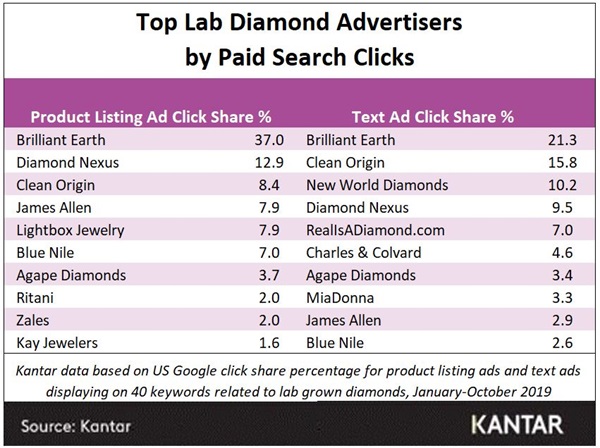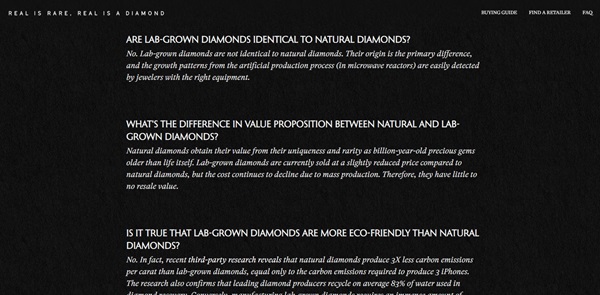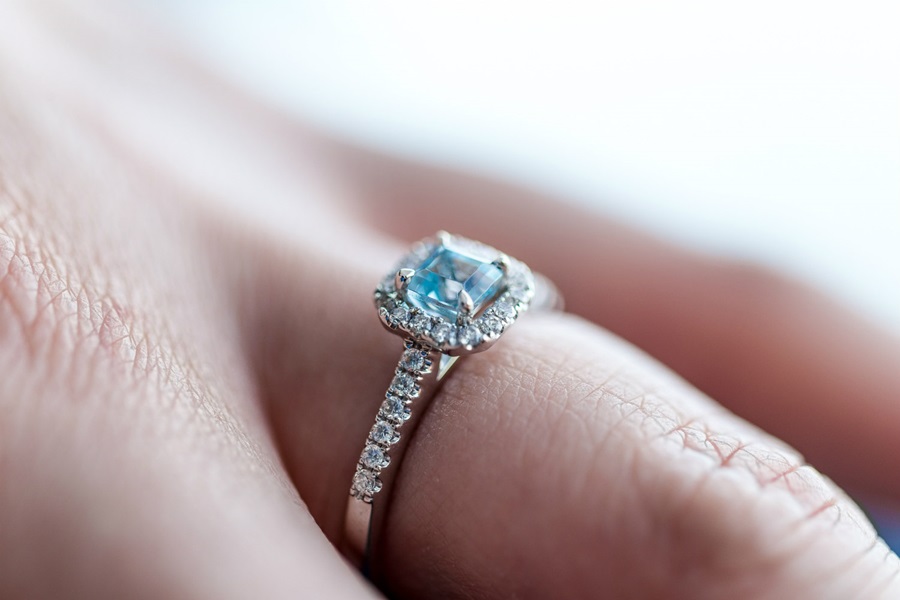Virtually the same as diamonds that are mined from the earth, lab-created diamonds are made from carbon as well and are nearly impossible to tell apart from mined diamonds without special instruments. In 2018, in fact, the FTC ruled that carbon-based diamonds are real whether they were created in the earth over millions of years or grown in a lab in a week.
The primary appeal of lab diamonds is for consumers concerned about so-called ‘conflict’ or ‘blood’ diamonds, which are said to fund terrorism and civil wars, and may also utilise child labour and have a negative impact on the environment. Lab diamonds are free from such pitfalls, and are also around 30% less expensive than their earth-mined counterparts.
To better understand this emerging market, Kantar analysed paid search advertising activity on U.S. Google for 40 popular keywords related to lab-created diamonds from January through October 2019, including ‘man made diamonds,’ ‘lab created diamonds,’ ‘lab grown diamonds’ and ‘lab diamonds’.

Jewellery Retailers with a Conscience

Overall, we found the field is being led by a new breed of socially conscious jewellery retailer who specialises in synthetic lab diamonds and, in some cases, conflict-free natural diamonds.
At the top is Brilliant Earth, whose stated mission is to "cultivate a more transparent, sustainable, and compassionate jewellery industry". Brilliant Earth dominated the paid search competition on the lab diamond keywords, garnering 37% of all product listing ad clicks and 21.3% of all text ad clicks on the keyword group during the first 10 months of 2019.
Clean Origin, which promotes diamonds consumers "can be proud to wear," ranked third in product listing ads with an 8.4% click share and second in text ads with a more substantial 15.8% click share.
Stating "diamonds are beautiful, but destructive," Diamond Nexus ranked second in product listing ads with a 12.9% click share and fourth in text ads with a 9.5% click share.
Traditional Retailers

The paid search competition on lab diamond keywords featured traditional jewellers as well, including Signet’s online retailer James Allen, which ranked fourth in product listing ad clicks and ninth in text ad clicks, as well as Zales and Kay Jewelers. Notably, Kay and Zales promoted lab-created white sapphires as well as mined diamonds in their ads, suggesting they are currently not selling lab-created diamonds.
In addition, De Beers, a company synonymous with diamond mining and sales since the late 19th century, has its own retail brand specialising in lab-grown diamonds, Lightbox Jewelry, which ranked only slightly behind James Allen in product listing ads with a 7.9% click share.
Synthetic vs. Simulated

Interestingly, not all of the top lab diamond advertisers in the paid search ranking are offering the same product, that is, carbon-based synthetic diamonds, bringing into question what the term ‘lab-created diamond’ actually means for consumers.
For instance, Diamond Nexus sells lab-created "diamond simulants" not derived from carbon. Agape Diamonds, which ranked seventh in both product listing ads and text ads, also offers a "simulated" diamond, which costs substantially less than carbon-based lab diamonds (about $1200-$1400 for an engagement ring). And Charles & Colvard, which ranked sixth in text ads, creates jewellery featuring lab-created moissanite, a rare natural mineral.
The Resistance

Some of the top advertisers on the lab diamond keywords during the period were not selling lab-created gems at all, but instead were actively promoting earth-mined diamonds to consumers searching for the synthetic alternative.
Blue Nile, which ranked sixth in PLAs with a 7% click share and tenth in text ads with a 2.6% click share, states outright in its text ads, "Every diamond we sell is verified authentic, natural in origin and ethically sourced." In addition, all of Blue Nile’s product listing ads that we observed promoted mined diamonds.

One advertiser, however, sticks out from the rest for its specific advocacy for mined diamonds—the Diamond Producers Association (DPA), an "international alliance of the world’s leading diamond mining companies", whose website RealisaDiamond.com ranked fifth in text ad clicks with a 7% click share.
According to its site, the DPA seeks to educate consumers on how mined diamonds are "sourced with integrity" as well as advocate among its members for "social & environmental responsibility" and "employee health & safety".
Under the tagline "Real is Rare. Real is a Diamond.", the DPA site promotes the aesthetic and intellectual pleasures of owning a 3-billion-year old object and features an FAQ page dedicated to unfavourably comparing lab-grown diamonds to natural diamonds (see screenshot above).

